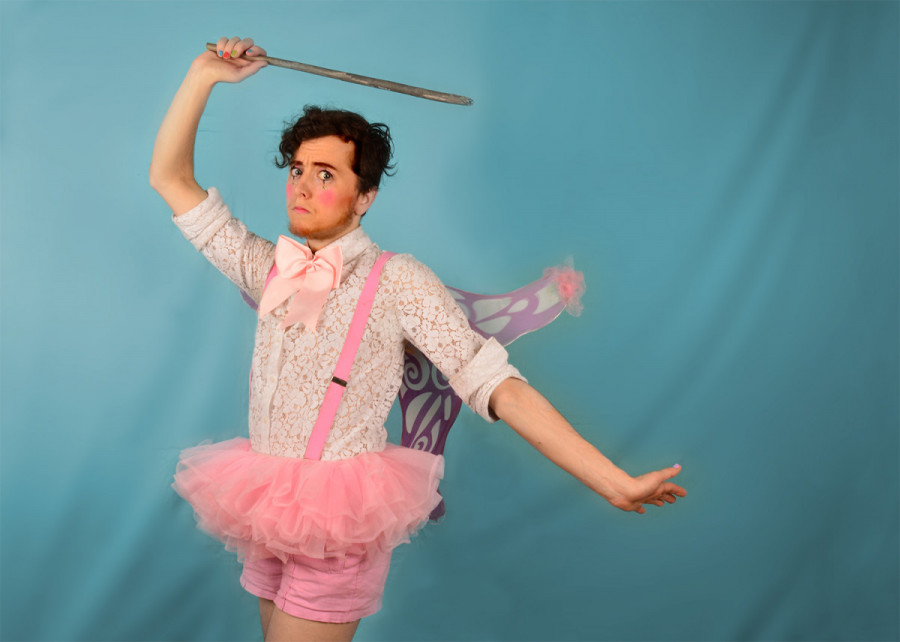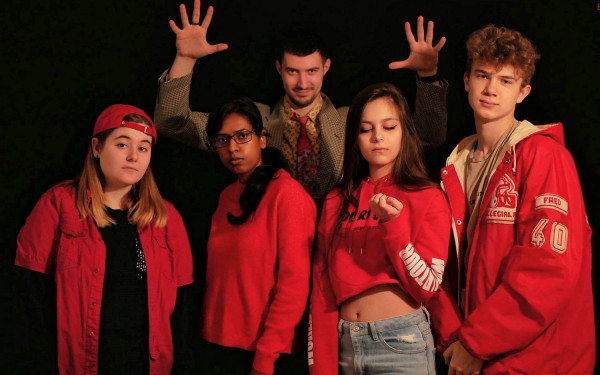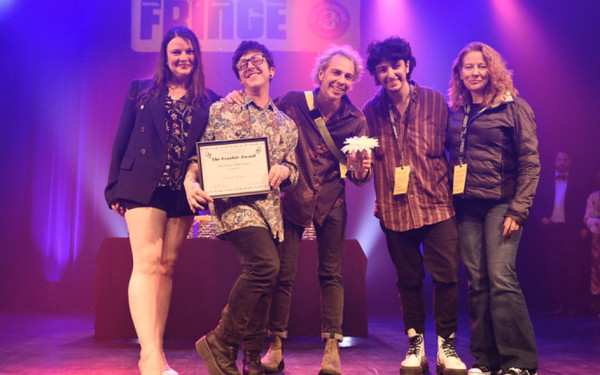‘Fairy Fails’ Blends Clown and Dance in a Whimsical Story
The Fairy Who Couldn’t Fly Stopped by At the Fringe Fest
There’s probably nothing sadder than a fairy who can’t fly. After all, what are fairies known for, if not their glamorous wings, sparkling outfits, and bubbly personalities?
Performed at the Montreal Fringe Festival, and written by and starring Meander, also known as Dot Dot Dot, Fairy Fails tells the story of a fairy, prince of all the land, who, though donning iridescent fairy wings that twinkle in a shiny pink glimmer, cannot fly.
Enter tears here, my heart is bleeding unicorn tears.
With a hearty sense of humour, Fairy Fails dipped into the fairy’s world. The play drifted through Meander’s diligent attempts to get his wings working, all the while engaging in lively, well-crafted dance routines that broke the fourth wall, sending the audience into fits of laughter.
The play is a mix between dance and clowning said Meander.
“I love fairy tales,” he explained. “I love children-esque things, even though this is a show for adults. I love that blend of the innocence with more complex topics.”
As Yann Tiersen’s “Comptine d’un autre été” began to play over the speakers, out pranced our hero clad in pink suspenders, a bright bow tie, a tutu and, of course, lustrous fairy wings.
Dancing across the stage in a couple of pirouettes, the show’s opening sequence emitted a certain feeling of longing. Yet the routine was filled with an unmistakable humour as he glanced at the audience with a sly smile.
“What’s fun about clowning is that you can be really honest with what’s happening,” said Meander. The show also marks his first solo performance.
“I’m proud, because I wanted to do a solo show for, like, years,” said Meander. “[I thought to myself that], someday I’ll do a solo show, and I made it happen.”
Fairy Fails uses spoken narrative over the speakers to describe each scene, paired with popular music that often launched the character into a dance sequence.
“I love fairy tales.I love children-esque things, even though this is a show for adults. I love that blend of the innocence with more complex topics.” — Meander
A memorable moment had R. Kelly’s “I Believe I Can Fly” pouring out from the speakers, Meander scrambling across the stage, jumping up and down on a trampoline to stimulate flight, frustration etched into his face. The audience cheered in support.
More than once, the performer dipped into the audience, taking a seat to watch the empty scene, or rubbing his wings up against the crowd in a sultry yearning. The audience just loved it, basking in the discomfort with amusement and laughter.
Engaging with the crowd is a part of clowning, explained Meander. According to the performer, an absence of the fourth wall, paired with honesty, is what makes clowning, well, clowning.
“If you’re embarrassed, you’re sharing that with the audience. If you’re really proud, like really really proud, normally you’d try to press that down,” said Meander.
“But as a clown, you’re kind of wearing your heart on your sleeve. But it can also be through a mask, or a character that there’s still [this] honest feeling coming through.”
Though the character does not speak in the play, Meander expressed thought, feeling, and emotion through physicality, facial expression, and those ever-important moments where the fourth wall disintegrated in front of the audience’s eyes.
At one point, Meander even went through an entire character change, becoming a doctor who promised to fix his wings. Still, Meander’s sass resonated, the performer somehow managing to embody both characters at the same time.
“[Meander is] a dapper snapper,” said Meander. “I describe [him] as a gentle boy, a sweetness, a side of sass. There’s a lot of gentleness and tenderness and playfulness.”
Creating the character was a process inspired by other clowning and performance artists, explained Meander. One teacher, the Montreal-based Francine Coté, was an inspiration.
“Her philosophy is that whatever is weird about you is what your clown is going to be based on,” he explained. “If you’re a little bit loud, you giggle too loud, you’re authoritative, if you’re submissive—whatever is a bit extra about you, that’s the special gem that you nurture into becoming a clown. It’s really beautiful.”


_600_832_s.png)

_600_375_90_s_c1.jpg)


